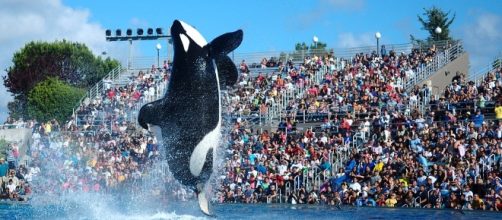The three-month old killer whale, Kyara, died of a possible pneumonia infection at Seaworld Park in San Antonio, Texas. Despite intensive treatment from veterinary teams, the calf was unable to survive the infection that she had been battling for the past week.
Seaworld has not captured any orcas from the wild in nearly 40 years, most of Seaworld's total of 22 orcas were Born In Captivity under an orca-breeding program. This breeding program ended in March 2016 after the park experienced backlash from animal rights activists.
Kyara was the last orca to be born in captivity under Seaworld's former orca-breeding program.
She was conceived under the breeding program, but was born to her mother, Takara, in April of this year.
Seaworld on Decline
Seaworld's overall attendance records in all three of its U.S parks (Orlando, San Diego, and San Antonio) have been on the decline over the past couple years. The park has received copious amounts of negative press and a shift in public perception since the release of the documentary, "Blackfish," in 2013. The documentary criticizes the park's treatment of orcas as entertainment props rather than actual living creatures. Since the documentary gained popularity, the park has struggled to rejuvenate its reputation.
In the last quarter of 2016, the park had 30,000 fewer visitors than the last quarter of 2015.
The revenue and numbers of attendees at the parks continues to drop.
Many animal activists are calling for an end to orca captivity altogether. According to a report done by BBC, Orcas in the wild travel up to 62 miles every day. Living in a tank just cannot compare to the vastness that an actual ocean provides these creatures.
It has been reported that in the wild, female orcas can live up to 50 years. To put this in perspective, studies found that orcas in captivity live just about 12 years typically.
Will Seaworld keep trying to make a comeback?
The answer is yes, but not by yielding to the contested debate of orca captivity. Despite public cries, Seaworld does not plan to release their 22 remaining orcas from captivity.
Seaworld has said that they plan to keep their orcas on display for future research on killer whales.
However, the parks are planning to eliminate killer whale performances altogether by 2019. The park plans to transition into what they call "natural orca encounters" starting this year. In this new program, the park is attempting to provide orcas with a more naturalistic experience that focuses on "research, education, care, and respect."


